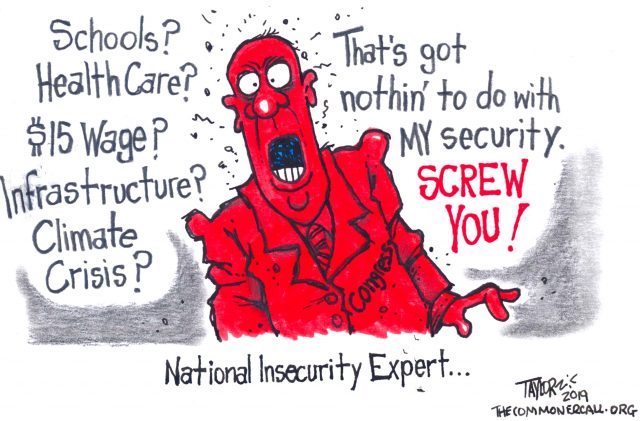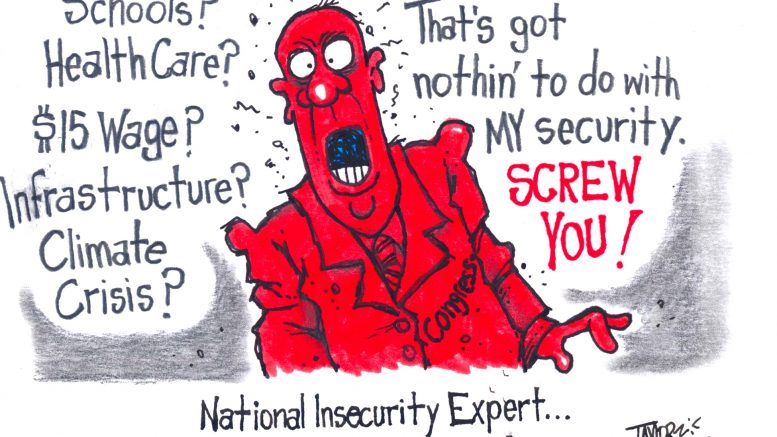
Neoconservative foreign policy— support for right-wing coups abroad, stealth wars and the consolidation of power in the U.S. presidency, are matched through neoliberal support for Wall Street and austerity programs.
By Rob Urie
Counterpunch (4/24/20)
Something to consider while suffering through the daily barrage of fabulist blather from Donald Trump is that if the Democrats thought it would benefit their cause, they would be putting Joe Biden front and center to counter this pain. That they aren’t suggests that they understand exactly how politically tenuous Mr. Biden is. In turn, that Joe Biden is their choice suggests that all isn’t what it could be in duopoly-party land. And coming in the midst of serial trillion-dollar bailouts, capitalism is looking a bit iffy as well.
To clarify, the point of this piece isn’t to debate the relative merits of Team Red versus Team Blue. It is to consider why this pairing is the best that late-stage capitalism has to offer. Others who care can dwell on the policy specifics of Mr. Trump’s rewrite of NAFTA versus Mr. Biden’s support for the original. The question in need of an answer: is this election evidence of a broken political system, or is ‘our democracy’ working exactly as the duopoly parties and the oligarchs they serve want it to work?
There is a Grand Canyon-sized disconnect between popular understanding of electoral politics— ‘democracy,’ and its role in capitalist political economy. While this may seem self-evident to many readers, party affiliations and class hegemony have been quite effective at muddying the waters. Within electoral logic, politicians work to garner votes, not to illuminate the constraints imposed by the two-party and state capitalist systems. But it is the latter that determine electoral outcomes through control of the process, not voters.
The best that can be said about American elections is that no matter who is elected, neither the process by which they were chosen nor the form of political economy over which they will govern will have been democratically chosen.
In the modern era, Jimmy Carter, Ronald Reagan, Bill Clinton, Barack Obama and Donald Trump all ran as political outsiders and won. And all supported the interests of capital and the further consolidation of political choice upon entering office. Were this the result of democratic mandate, so be it. But the fact that each became a political insider— not just in that they entered office, but in terms of whose interests they represented, suggests that electoral politics isn’t where important political choices are made.
Empty, no-risk corporate liberalism
An allegory of sorts can be found in corporate statements of guiding principles. Monsanto’s Code of Business Conduct, ExxonMobil’s Standards of Business Conduct and Goldman Sachs’ Code of Business Conduct and Ethics all abhor racial and gender discrimination and support diversity, inclusivity, LGBT rights and personal self-realization. As articulated, these liberal values are part of the belief system of the professional class and the American left. And they have been given legal backing through anti-discrimination laws.
They are also wholly irrelevant to how these firms conduct their businesses. Representing different industries— agriculture, oil and gas and finance, these Codes represent a corporate ‘view’ that is part moral self-flattery, part appeal to group (‘shared’) values, and part legal preemption and self-defense. However, few describing these businesses would think to include the stated principles in a description of what they do. They are beliefs that are unrelated, except in very narrow circumstances, to actions.
Through the ‘revolving door’ of employment between government rule-making and corporate profit generation, large, multinational corporations are the Federal government. This isn’t simply a matter of who sits where. Monsanto writes agricultural and food policy; ExxonMobil writes energy and foreign policy and Goldman Sachs writes financial policy for the Federal government. And when they don’t write policy directly, Congress is good at taking dictation.
That these companies are also among the more destructive forces in human history carries with it moral and political content. Monsanto produces the carcinogenic pesticide Roundup, the neonicotinoid pesticides contributing to mass extinction and inadequately tested GMO seeds. ExxonMobil is a central actor causing climate change while funding climate change denial research. Goldman Sachs is known as ‘Government Sachs’ for its outsized role in crafting and profiting from government regulatory and financial policies around the globe.
Each represents its respective industry in the American corporate model of controlling all sides of the transactions they participate in. They do so under the cover of buying and selling in ‘free’ markets. As with the choice between duopoly party candidates, ‘markets’ in this case are the end of an economic process, not the beginning. These corporations use state and state-granted power— military, monopoly, legal, structural, and historical, to obtain resources on the cheap, eliminate competitors and control markets.
Many of the people working for these corporations, particularly those in leadership positions, believe in the liberal values espoused in the corporate Codes, even though they have no bearing on how business is conducted. This dualism finds #Resistance liberals living in racially segregated neighborhoods while sending their children to racially segregated schools. The same is true of corporate hiring. ‘Qualifications’ are a proxy for class— and through it race, that provide an empirical rationale for ‘legitimate’ discrimination.
Separating beliefs from actions
Interpreting political outcomes by what politicians and / or corporate leaders say, rather than what they do, is the flip side of separating beliefs from actions. Because the role of the Democrats in the duopoly system is to feign having principles (keep reading) —they use the equivalent of corporate Codes to sell their political programs. For instance, Barack Obama hailed an EPA program to close coal fired utilities in the U.S. as an environmental victory even as he sold the unused coal to China.
Hypocrisy isn’t the point here. The social mechanisms that separate what political actors believe from what they do are. The currency of these corporations is power. Each have legal, tax, regulatory and lobbying departments that are as central to their businesses as those that produce their nominal products. The revolving door illustrates the merging of state with corporate power. Likewise, corporations are considered extensions of state power, hence the relation of trade and trade agreements to foreign policy.
The economists have this relationship perfectly backwards. …
(Commoner Call cartoon by Mark L. Taylor, 2019. Open source and free for non-derivative use with link to www.thecommonercall.org )

